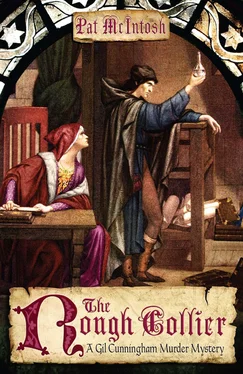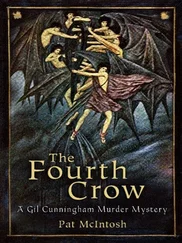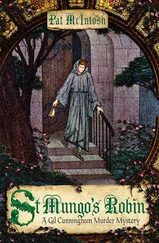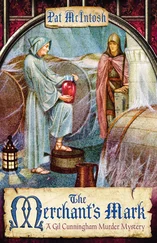Pat McIntosh - The Rough Collier
Здесь есть возможность читать онлайн «Pat McIntosh - The Rough Collier» весь текст электронной книги совершенно бесплатно (целиком полную версию без сокращений). В некоторых случаях можно слушать аудио, скачать через торрент в формате fb2 и присутствует краткое содержание. Жанр: Исторический детектив, на английском языке. Описание произведения, (предисловие) а так же отзывы посетителей доступны на портале библиотеки ЛибКат.
- Название:The Rough Collier
- Автор:
- Жанр:
- Год:неизвестен
- ISBN:нет данных
- Рейтинг книги:4 / 5. Голосов: 1
-
Избранное:Добавить в избранное
- Отзывы:
-
Ваша оценка:
- 80
- 1
- 2
- 3
- 4
- 5
The Rough Collier: краткое содержание, описание и аннотация
Предлагаем к чтению аннотацию, описание, краткое содержание или предисловие (зависит от того, что написал сам автор книги «The Rough Collier»). Если вы не нашли необходимую информацию о книге — напишите в комментариях, мы постараемся отыскать её.
The Rough Collier — читать онлайн бесплатно полную книгу (весь текст) целиком
Ниже представлен текст книги, разбитый по страницам. Система сохранения места последней прочитанной страницы, позволяет с удобством читать онлайн бесплатно книгу «The Rough Collier», без необходимости каждый раз заново искать на чём Вы остановились. Поставьте закладку, и сможете в любой момент перейти на страницу, на которой закончили чтение.
Интервал:
Закладка:
‘And you all stayed in here till you went out to see them off.’
‘That’s right. What does it matter, anyway?’
‘We need to find out all we can about how the man died,’ Alys supplied. Bel turned wide blue eyes on her, considering her carefully, but gave no other sign. ‘I should like to look in your mother’s herbal, that she keeps in the stillroom. I wondered, too, if you would let me look at the great account book, the one your grandam showed me the first day we were here.’
‘It’s in her chamber,’ said Phemie. ‘Why? What will that tell you, just columns of numbers and names like that?’
Oh, my dear girl, thought Alys, and you a merchant’s daughter too. Aloud she said only, ‘It will tell me if Murray was an honest workman, as everyone says he was. If he was stealing from the business,’ she amplified, in answer to Phemie’s puzzled look, ‘it should show in the accounts, though it might be far to seek. How long was he here?’
‘Five year, maybe. If he was stealing coin, Arbella would notice,’ said Phemie. ‘Have you not seen yet that nothing happens up here by the Pow Burn that she doesny know of, one way or another?’
And that was not what you said before, thought Alys.
Bel stood up abruptly, gestured for Alys to follow, and led her out into the hall. Socrates’ claws clicked on the flagstones as they went the length of the wide space and through a doorway at the back, into another pair of chambers. This was, quite plainly, Arbella’s apartment. Alys looked about her curiously.
The chamber nearest the hall was panelled and painted, with several figures of saints on the wall by the fireplace and a garland of flowers round under the rafters. A curtained bed took up most of the floor, with a clothes-kist at its foot. There was a musty smell which made Alys wrinkle her nose. Socrates, pressed close against her thigh, raised his head, sniffing, and the hair lifted on his narrow back. Bel glanced at the bed, with its neatly bagged-up curtains of verdure tapestry, almost as if she expected to see it occupied, but went round it to the further door and opened that.
The inner chamber was small and gloomy. A bench at one end held a fortune in glassware, the delicate blown shapes reflecting light from the high tiny window. Alys identified flasks, two alembics and several curving tubes whose use she could only imagine. There was red wax to stop the joints with, and a stand below which one could place a small charcoal burner. This was more than a stillroom, she thought, recalling Mère Isabelle’s working quarters.
The musty smell was stronger here, with a foxy overtone which made her gag, and a definite recollection of a mews she had once been shown. She was unsurprised when Bel pulled open one of the drawers beneath the bench to see it crammed with rustling linen bags, each neatly labelled in the same beautiful hand as in the account book. Arbella’s herb collection also rivalled Mère Isabelle’s.
‘Did you gather all these?’ she asked, bending to look at the labels, but Bel gave her a pitying look, closed the drawer by bumping it with her hip and reached to open another. Over their heads feathers ruffled, and both girls looked up; following Bel’s gaze Alys found she was being watched by round pale eyes, peering from the shadows above the window. ‘An owl?’ she exclaimed. ‘Can it be an owl, here in the house?’
Bel nodded, glowered at the creature, and with some ingenuity extracted something large and rectangular from the drawer she had touched, using her skirt to shield it from — yes, certainly from the owl’s gaze.
‘They are everywhere,’ Alys said. Bel nodded again, clutching her prize under the folds of blue wool, and jerked her head to summon Alys into the outer room. Kicking the door shut behind them, she set the great account book carefully on a little prayer-desk by the head of the bed, then smoothed down her skirt and mimed someone holding a bird, stroking its feathers, simpering with affection. ‘It’s your grandam’s pet?’ Alys guessed. Bel nodded, but turned to the book. Opening the leather-bound boards, she leafed through the pages until she found the most recent entries, and stood back in triumph.
The accounts were very clear, and gradually drew Alys’s thoughts away from the presence of the owl. The movement of coin, in and out of the coaltown, was meticulously itemized. The coal was tracked with equal precision. The numbers added up, marching down the pages, each line a distillation of some man’s labour in the dirty, sweaty dark of the mine. I am fanciful, Alys told herself, turning back leaf by clearly inscribed leaf. It must be the effect of kneeling before the book like this, as if it was a prayer-book. The dog sat tall beside her, his chin on her arm, almost as if he too was reading the elegant writing.
Bel touched her hand to get her attention, and when she looked up sketched Arbella’s wired headdress and upright stance, then folded her hands as if in prayer.
‘She prays over the book?’ Alys guessed. Then she thought, how silly, it is such an illogical fancy, but Bel nodded, unsmiling. How did she guess what was in my head? she wondered.
Two years back, in ’91, a flurry of extra work was recorded. A winding-shaft and its shelter, yhe new over wyndhous , was carefully accounted for, along with the wood to build the gear and a heavy hemp rope. Joanna’s dowry and inheritance being put to the good, thought Alys, and yet they don’t seem to use the shaft. There was no mention of Matt’s death. She turned further back, and became aware that the figures were changing. Comparing the Lady Day accounting year by year, when the returns on the winter’s coal would have come in, she could see that the profits were not so good in recent entries as the earlier ones. She detected no abrupt change when Murray came to the coaltown, nor when he was promoted to grieve, though both these events were noted.
She turned more pages. The death of the younger Adam Crombie, Beatrice’s husband, was signalled only by a record of the extra work needed in 1484 to clear the roof-fall. Studying the numbers which lay on the page before and after it, she came to the reluctant conclusion that business improved after his death, and then slowly deteriorated to the present figures.
Why should that be so? she wondered. Was it a question of the control of the business, or of who had a say in where the money went? What difference had it made when the younger Adam died? She heard Beatrice’s voice in her head — My man never liked to have much to do wi’ the pit, Our Lady succour him. Presumably matters went better when Arbella had sole control.
She turned back through the book, considering the implications of this. But even if her suspicions were correct, there was no need to poison Thomas Murray. Unless he had uncovered the same facts that she had recognized. Murray had questioned Isa in the kirk in Carluke, she recalled. But Sir Simon at Dalserf had no knowledge of him, had presumably never met him.
‘Does anyone else look at these accounts?’ she asked Bel, who was still watching her intently. The other girl shook her head, and pointed firmly in the direction of the drawer where the book had been stowed. ‘Not Thomas, not anyone else?’ Another shake of the head. She turned a leaf, and registered the same change in the figures in March of 1477. The year Arbella’s own husband, the older Adam, had died. And what has Gil discovered? she wondered. How did the man die, sixteen miles from here, too far to bring the body home? I would bring Gil back if he died in — in — in Paris, she thought.
Bel was becoming restless. She put a hand out as if to redirect Alys’s attention to the most recent accounts, but did not touch the book.
‘I will not be long,’ Alys assured her. ‘I have seen nearly enough.’ She turned more pages back with care, one and then several together, and there it was, the information she was sure she would find, laid out on the page in complex looping letters. ‘Bel,’ she said slowly, ‘do you know whose hand this is? There’s half a year in a different writing.’
Читать дальшеИнтервал:
Закладка:
Похожие книги на «The Rough Collier»
Представляем Вашему вниманию похожие книги на «The Rough Collier» списком для выбора. Мы отобрали схожую по названию и смыслу литературу в надежде предоставить читателям больше вариантов отыскать новые, интересные, ещё непрочитанные произведения.
Обсуждение, отзывы о книге «The Rough Collier» и просто собственные мнения читателей. Оставьте ваши комментарии, напишите, что Вы думаете о произведении, его смысле или главных героях. Укажите что конкретно понравилось, а что нет, и почему Вы так считаете.












